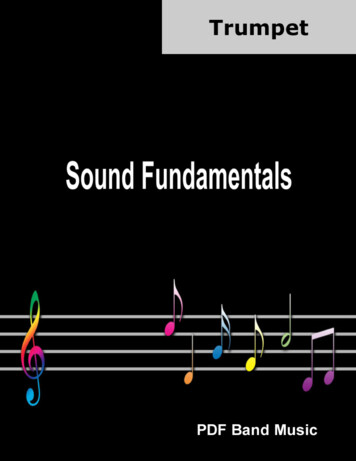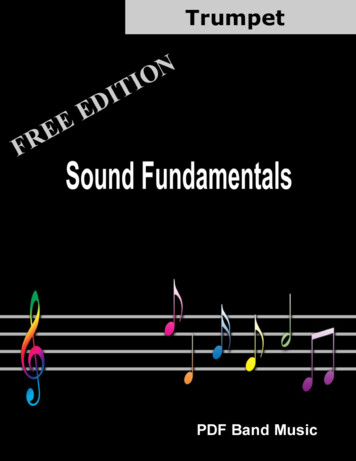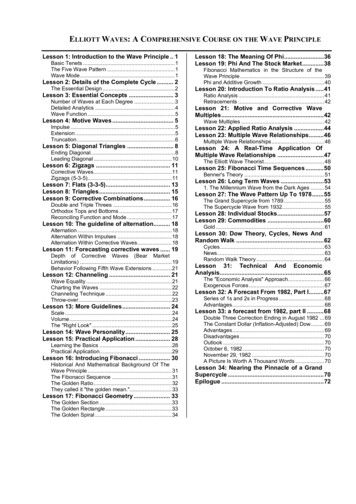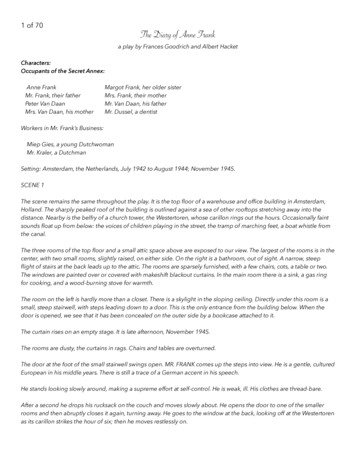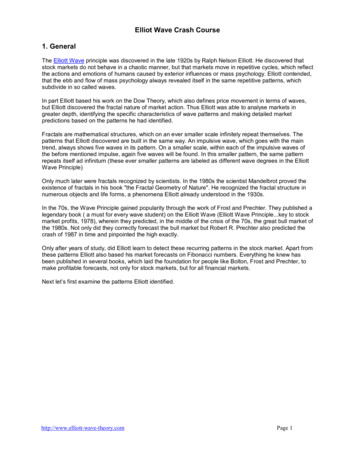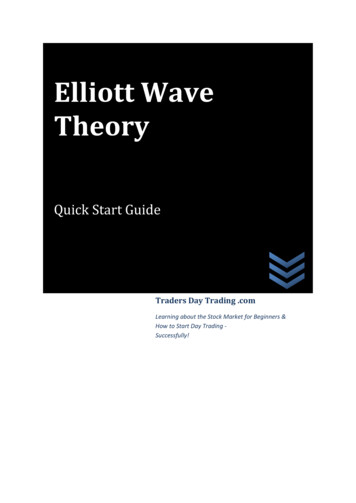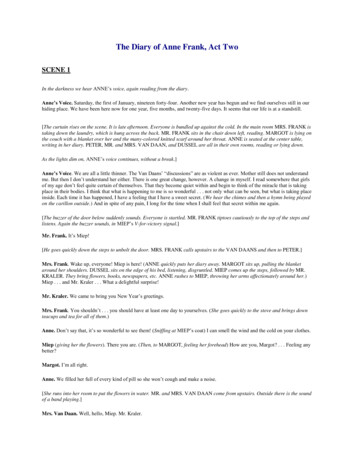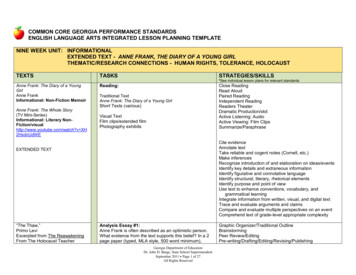
Transcription
LIFE LESSONS FROMPROVERBSBY ANNE ELLIOTThttp://www.AnneElliott.com
Copyright 2003, 2010 by Anne ElliottAll rights reserved. No part of this book may be used or reproduced in any mannerwhatsoever without written permission, except in the case of brief quotationsembodied in critical articles or reviews.Published 2010http://www.AnneElliott.comScripture marked “NIV” taken from the HOLY BIBLE, NEW INTERNATIONAL VERSION .Copyright 1973, 1978, 1984 Biblica. Used by permission of Zondervan. All rightsreserved.Scripture marked “ESV” taken from the Holy Bible, English Standard Version (ESV) isadapted from the Revised Standard Version of the Bible, copyright Division of ChristianEducation of the National Council of the Churches of Christ in the U.S.A. All rightsreserved.Scripture marked “NKJV” taken from the New King James Version. Copyright 1982 byThomas Nelson, Inc. Used by permission. All rights reservedScripture marked “KJV” taken from the King James Version.2
LIFE LESSONS FROM PROVERBSIntroduction4Why Study Proverbs6The Fear of the LORD11Mothers and Fathers and Sons17The Rod of Correction23The Downfall of the Wicked28A Practical Way to Honor the LORD34The Benefit of Wisdom373
IntroductionWelcome to our Bible study on the book of Proverbs.Before we begin, may I suggest an excellent homeworkassignment? Please read a chapter a day of the book of Proverbs,beginning with Proverbs 1 on October 1, etc.During the month, take a yellow pencil or marker and markeach verse that lists a benefit of following God's wisdom.For instance, in my Bible I've marked the followingverses: “But whoso hearkeneth unto me shall dwellsafely, and shall be quiet from fear of evil”(Proverbs 1:33). “The blessing of the LORD, it maketh rich, andhe addeth no sorrow with it” (Prov. 10:22).You'll find MANY, MANY more than just these two examples! Havefun!Now, before we officially begin, what is a proverb?Author Jay Adams says,"A proverb (the word means a comparison or likeness) is a crisplystated principle of living."11from Competent to Counsel, by Jay E. Adams, p. 984
The book of Proverbs uses a form of Hebrew poetry that is unfamiliar tous because it doesn't rhyme. Instead, many proverbs are comparisonsthat basically state the same thing twice."Whoever listens to me will live in safetyand be at ease, without fear of harm" (Proverbs 1:33).Other Proverbs contrast two things." A poor man pleads for mercy,but a rich man answers harshly" (Prov. 18:23).To study these verses, I simply used a Strong's ExhaustiveConcordance. This is a handy, big-huge reference book that lists everyword of the Bible in alphabetical order. Next to each word, you'll see a fragment of how the word is usedin a verse plus a number.You can then look up the number in the back of the concordancefor a more thorough definition of the word in the original Hebrew,plus a listing of all the ways this word is used in the Bible. It'sreally helpful!If you don't own a Strong's Concordance, don’t worry! It’s much easier,actually, to use online versions, such as the study tools available athttp://www.blueletterbible.org. However, I first learned how to use aconcordance with a "real," book version, rather than the virtualversions.5
Why Study ProverbsToday we're going to look at Proverbs 1:1-7:The proverbs of Solomon son of David, king of Israel:for attaining wisdom and discipline;for understanding words of insight;for acquiring a disciplined and prudent life,doing what is right and just and fair;for giving prudence to the simple,knowledge and discretion to the young—let the wise listen and add to their learning,and let the discerning get guidance—for understanding proverbs and parables,the sayings and riddles of the wise.The fear of the LORD is the beginning of knowledge,but fools despise wisdom and discipline.What are the benefits we'll gain from studying and applying the book ofProverbs? I see four benefits in verses 2-3:“ for attaining wisdom and discipline;for understanding words of insight;for acquiring a disciplined and prudent life,doing what is right and just and fair ”1) We will know wisdom (verse 2).“ for attaining wisdom and discipline” The word "know" (Strong's #3045) means to know using a greatvariety of our senses. It's interesting to me that this is the sameword used to describe the tree of the knowledge of good and evilin Genesis 2:9 and 17.6
This word is the opposite of taking something by sight or at facevalue. ("By sight" is how the word is used in Numbers 15:24 andRuth 2:10.) It's the difference between saying we know someone because werecognize her long, brown hair and her familiar nose, and sayingwe know our husbands! God wants us to KNOW His wisdom!2) We will know discipline (verse 2). You could substitute the word "spanking" or "chastisement" here(Strong's #4148). It is a warning or a reproof. Why is this a good thing!? Because it's comforting to know Godloves us enough to not let us get away with sin. It's also nice toknow that we can "learn our lessons" by reading and applying thewisdom in the book of Proverbs instead of having to always learneverything the hard way. In this fabulous book, God allows us tohave a glimpse into the bad choices that others have made, so wecan learn from them -- and avoid making those terrible errorsourselves!3) We will understand words of insight (verse 2). We will understand or perceive (Srong's #995), which means toseparate mentally or to distinguish -- to be able to choose the bestfrom all the options, so to speak. Unbelievably, “insight” is Strong's #998 and is a derivative of#995. So God is going to teach us how to "distinguish the words ofdistinguishment." In contrast, Satan tries to lie to us and make things very unclear.How good God is!4) We will receive a disciplined and prudent life, doing what is right andjust and fair. Instruction here is the same as “discipline” above, meaning"chastisement."7
Prudent (#7919) means intelligence and looking in all directionsfor the best choice. As my husband so aptly said, we will receive"common sense." (Wouldn't that be nice?) We also learn how to do what is right, just and fair -- traits sorelyneeded in wives and mothers, don't you agree?So who needs to read this book? (I think we're all waving our hands andshouting, "We do! We do!")“for giving prudence to the simple,knowledge and discretion to the young—let the wise listen and add to their learning,and let the discerning get guidance ” (Proverbs 4:4-5).1) The simple (verse 4). A simple person is silly and easily seduced(#6612). However, God promises to give the simple person"prudence" (#6195), which means trickery -- or in a good sense,discretion. In other words, the silly and easily fooled person willlearn to make wise choices and avoid being tricked! Wow! Psalm19:7 says, " The statutes of the LORD are trustworthy, makingwise the simple.”2) The young man (verse 4). This is helpful for us parents to keep inmind -- and even for ourselves, on those days we feel quite youngourselves! The young man will gain the knowledge spoken ofabove, and he'll also receive discretion (#4209). Discretion ishaving a good plan! What young person doesn't need thesethings?3) The wise (verse 5). The wise man will listen and will increase hislearning. In other words, those who are already wise from dailymeditation on God's Word and years of study will CONTINUE toincrease their wisdom. There is no one who cannot continue togrow and improve!8
4) The discerning (verse 5). Again, those who are able todistinguish between the better and the best will find wise counseland guidance. How many times have we all needed a personalcounselor? God promises to guide us with His very own wisdom inthis special book. This is one of the reasons I suggest that you reada chapter every day, so that the Holy Spirit can point out certainverses to you and be your "wonderful counselor" (Isaiah 9:6).So where do we start if we want God's wisdom? Verse 7 says that "thefear of the Lord is the beginning of knowledge." Fear here means"reverence" (#3374).Elizabeth Elliot, in her book The Shaping of the Christian Family, says,"Although the Bible has much to say about the fear of the Lord,Christian teaching on it is rare today. Objections are raised as soonas it is mentioned. Isn't fear a base motive? Why should we fear Himwho loves us as He does? If He is our Shepherd, Savior, and Friend,how can we be afraid of Him? 'He is not a tame lion,' as C.S. Lewissays. A child's fear of physical punishment leads him to obedience,but so does his natural desire to please the people he loves. It is thebeginning of respect. Until we love perfectly, which will not happenon this fallen planet, we must fear. Until perfect love casts it out,fear is a salutary thing. Fear saves us."2We'll talk more about this fear next lesson, since verse 7 says this iswhere we should begin.Finally, let's conclude with the warning given in verse 7."Fools despise wisdom and instruction."What is a fool? A fool (#191) is a stronger version of a simple man, andhe's described as being perverse and silly. Other meanings for the word"fool" in the Old Testament are "stupid" (see Proverbs 1:22, KJV) and"vile" and “perverse” (see Psalm 53:1).2From The Shaping of the Christian Family, by Elizabeth Elliot, pp. 125-126.9
We sometimes see our children despising the wisdom we give them, oreven despising our "chastisement" of them when they do somethingwrong. Proverbs calls them a fool -- and it calls us adults a fool if weread the book of Proverbs yet despise the wisdom we find there. We'lltalk in the lessons ahead about the horrible outcome of the foolish andhow we don't want ourselves or our kids labeled a fool!In conclusion, let's hop over to two of my favorite verses in Proverbs.I'm sure you've heard these verses before as well."Trust in the LORD with all your heartand lean not on your own understanding;in all your ways acknowledge him,and he will make your paths straight" (Proverbs 3:5-6).These verses sum up all that God wants to do for us through our studyof Proverbs.They also describe our responsibility -- to trust with all our hearts, andnot to lean on our own understanding.(May I recommend reading the book Assumptions That Affect Our Lives,by Christian Overman?)10
The Fear of the LORDIt's time for another study in the incredible book of Proverbs. The moreI study this book, the more overwhelmed I feel at even attempting tocover all the truths it discusses. Where do I even begin?Thankfully, Proverbs tells us where to begin:"The fear of the LORD is the beginning of knowledge" (Proverbs1:7)."The fear of the LORD is the beginning of wisdom" (Proverbs9:10).Last lesson, we briefly discussed what the fear of the Lord is. I think Ican best illustrate it by telling you about my kids. My children are fairlyobedient. Probably eight times out of ten, if I ask them to do something,they'll do it. But nothing frustrates me faster than to have one or moreof them disobey or even obey with a bad attitude, over and over, all daylong. Even worse is when they repeatedly disobey me, but when DADDYwalks in the door, they immediately do as he says. It's not fair!Then again, I remember when I first met my husband. You see, he'sthree times my size! When he sits in a roomful of people, he sits a wholehead taller than anyone else. He has a booming voice. He even coughsloudly! And he's soooooo strong. I don't even seem to notice his sizeanymore. But I used to! I know he's a big teddy bear, but my children,several feet shorter than he is, are very wise to listen and obey whenDaddy speaks!Are they afraid of him? Well, when they've done wrong, sure they are!They're afraid in a good way. Their fear makes them listen, makes themobey, and makes them realize the consequences if they don't payattention. (Of course, I guess they all know that Mommy is wimpycompared to Daddy, so that's why it takes a little more for me to catchtheir attention. Not even the dog listens as well to me.)11
God wants us to fear Him. We don't hear much about fearing God, dowe? It seems to fly in the face of what we know about God. How can wefear a God who loves us, who is merciful and gracious, who is patient?Here's how -- in the same way my children, who wrestle with theirdaddy and give him bear hugs and smooches and cry if he's gone toolong and they miss him, FEAR him when they have done wrong.(See Proverbs 15:33 where it says that the fear of the Lord is theinstruction [#4148, chastisement, reproof, warning] of wisdom.)Proverbs goes into quite a bit of detail about the fear of the Lord,describing what the fear of the Lord is, comparing it to things we caneasily understand, and telling of its wonderful benefits. Let's looktogether at some of these.First of all, Proverbs 2:4-5 says that we can only truly understand thefear of the Lord if we seek (#1245, search or strive) for wisdom as wewould for precious silver, or search for it as we would hidden treasure.This implies a search after God and His wisdom that entails all ourresources, all our time, all our energy.This reminds me of the great command that Jesus taught: "Love the Lordyour God with all your heart and with all your soul and with all yourmind and with all your strength" (Mark 12:30). God wants all of me.Notice also that if we fear the Lord, there are certain things we'll hate.Proverbs 8:13 gives us a list: We'll hate evil, pride, arrogance, evilbehavior, and perverse speech.Pride (#1344) and arrogance (#1347) describe someone that mountsup, rises up and tries to be majestic. Doesn't this remind you of Satan,also called Lucifer, in Isaiah 14:12-14, where he said in his heart, "I willascend to heaven; I will raise my throne above the stars of God I willascend above the tops of the clouds; I will make myself like the MostHigh"? Such pride is from the pit of hell, and Proverbs warns us that ifwe fear God, we will hate pride.Perverse speech (#8419) comes from a Hebrew word (#2015) thatmeans to turn something over, evidently to hide it from others' eyes. If12
we fear God, we'll be honestly ourselves in His eyes and in others’. Wewon't pretend or fake or make ourselves out to be something betterthan we really are, especially in our speech. We'll be humble, admittingour faults and asking for forgiveness.We all realize that we're born sinful and that sometimes we continue tosin even when we don't want to (Romans 7:15-25). However, God seemsto think that sin is a choice that we willfully make.First of all, Proverbs 1:29 says that some people do not choose to fearthe Lord. The word "choose" here (#977) means to try something.Proverbs 3:7 says that we are to fear the Lord and shun evil. The word"shun" (#5493) means to turn off.To me, turning off means an action on someone's part, like when thekids are told to turn off the bathwater because the tub is getting too full.They can CHOOSE to turn it on or off (but they might not like theconsequences if they CHOOSE to disobey). We also must either CHOOSEto depart from evil or choose to be wise (#2450, intelligent, skillful) inour own eyes. We must consciously choose who is smarter -- us or God!Proverbs 16:6 again says that by the fear of the Lord, men avoids (sameword, #5493, choose not to do) evil.And again, Proverbs 14:27 says that the fear of the Lord is a fountain(#4726, source) of life, turning us (same word) from the snares of death.By actively choosing to fear the Lord, we choose life instead of death.(Some of us pro-lifers should put our "choose life" bumper stickersINSIDE our houses, where WE'LL be reminded to choose life personallyby obeying God's commands.)So, in summary, I think that the fear of the Lord means to choose to obeyHis commands, with an awareness of the consequences if we don't.There are almost too many benefits to fearing the Lord for me to listthem all. Briefly, Proverbs 10:27 says that the fear of the Lord adds lengthto our life.13
Proverbs 15:16 compares the blessings of having only fewpossessions with the fear of the Lord to having great treasure buta lot of turmoil (#4103, confusion, great agitation and uproar). Proverbs 19:23 says that he who has the fear of the Lord will restcontent (#7649, satiated, filled to satisfaction). He will touched bytrouble. Proverbs 22:4 says that by humility and the fear of the Lord areriches and honor and life.My favorite benefit is found in Proverbs 14:26, which says, "He whofears the LORD has a secure fortress, and for his children it will be arefuge." It reminds me that obedience to God gives me a refuge, security,and assurance when times are scary. Happily, my obedience extends tomy children, who will have a shelter where they can scurry when badtimes come. As a mom, this gives me great peace in a world filled withterror and evil.Let's close this discussion with a practical application for each one of us.Proverbs 23:17 says, "Do not let your heart envy sinners, but always bezealous for the fear of the LORD."One evening, my children asked if they could play in our front yard.Because of traffic, I warned them to stay within the protection of ourfence. A neighbor boy came riding by in his cool toy 4x4 truck. All mykids pressed their noses through the chain-link fence, ooh-ing and ahhing over his truck. However, only a moment later, the little boy steered itwrong and had a minor crash. (Note: He wasn't doing anything wrong -he had permission to be out there -- so maybe this is a poorcomparison.) But because my children "feared" me and stayed withinthe protection of the yard the whole time they were outside, they werespared from getting hurt.God wants us to fear Him "all the day long” (KJV). The word "day" here(#3117, literally from sunrise to sunset) implies that we are to live asconscious of God's presence from the moment we get up, through all ouractivities of the day, and until we go to sleep at night.I can only conclude that if we want to have the fear of the Lord, we must"renew our minds" (Romans 12:1-2) by studying His Word daily and14
CHOOSING to obey it, moment by moment, no matter the activities inwhich we're involved. This is yet another reason I'm going to continueto nag you to be reading from Proverbs every morning. I can think of nobetter way to begin renewing your mind. As David says in Psalm 119:11,"I have hidden your word in my heart that I might not sin against you."Again, in Psalm 119:97, he says, "Oh, how I love your law! I meditate onit all day long."15
One of my biggest worries is that I'll make the book of Proverbs look too difficult to study and too hardfor you to understand. I want you to realize that this wasn't hard to study at all! You can do this!!! Firstof all, I looked up the word "fear" in my Strong's Concordance. I wrote down every time "fear of theLord" was used in the book of Proverbs. Then, next to the references, I wrote a brief summary of whatthe verse said. Then I looked up the meanings of specific words in those verses, using the Strong'sreference numbers and looking up those numbers in the Hebrew dictionary in the back of my Strong'sConcordance. (Note: I originally used the King James Version for this study.)That's it! It's easy to do (although rather time consuming), and I want you all to know that YOU can doit, too!16
Mothers and Fathers and SonsLet's talk for a few minutes about child TRAINING. I've been lookingforward to this, but I have to admit, after studying it in Proverbs, I'mfeeling a lot more "sober" about this whole issue. God takes parentingVERY seriously, and we should, too!We first looked at Proverbs 1:1-6 and the purpose of this book. Lastlesson we looked at Prov. 1:7 and the fear of the Lord. Today and nextlesson, we're going to look at Proverbs 1:8-9 and the topic of sons andfathers and mothers.“Listen, my son, to your father’s instructionand do not forsake your mother’s teaching.They will be a garland to grace your headand a chain to adorn your neck.”I began my personal study by getting out my Strong's Concordance andlooking up all the usages of the words "mother" and "father" in Proverbs(in the King James Version). I found "mother" used 14 times and"father" used 18 times. I discovered that there are foolish children andrighteous children. I also found that there are wonderful blessings forrighteous children (and their parents), but there are also severeconsequences for foolish families. Let's look at some verses together.What does a foolish child look like? Let's look at Proverbs 19:26, which says, "He who robs his fatherand drives out his mother is a son who brings shame anddisgrace." Proverbs 28:24 says, "He who robs his father or mother and says,“It’s not wrong”— he is partner to him who destroys." Proverbs 30:11 says, "There are those who curse their fathers anddo not bless their mothers."As always when we look at Scripture, we shouldn't point fingers atOTHER people's children. Rather, let's look inward at how WE acted17
while growing up; then, if we have children, we need to check for theseevil behaviors in our own homes.However, think of this: where was the parent when his child wasstealing from him? Why didn't this parent teach his child that stealing isa sin? Why did the parent LET this child chase him or curse him? Who isthe adult here anyway? (Ever wonder these things?)My question is an age-old one. Who reaps the consequences for foolishchildren -- the parents or the children? For instance, I know parentswhose children are grown but do not live for God. Often, their parentswill say, "Well, we did our best. We just have to leave them to the Lordnow." I've also heard of grown children who have come back to Godonly to say, "It's all my parents' fault that I turned out the way I did! Ifthey had only done such and such, I wouldn't have had all these badthings happen to me!"Well, first, what are the consequences for foolish behavior for thechildren, whether small or grown? Proverbs 20:20 says, "If a man curses his father or mother, hislamp will be snuffed out in pitch darkness." Proverbs 30:17 says, "The eye that mocks a father, that scornsobedience to a mother, will be pecked out by the ravens of thevalley, will be eaten by the vultures."The descriptive language used here makes my heart get cold! How manymoms and dads say that their child's happiness is their number onegoal? Yet without discipline, Scripture warns that happiness is the LASTthing our children will have! I know that dreadful things happening toone of my children is the stuff of nightmares, yet a disobedient child isinviting the curse of God.What about the parents? What misery will they have to live with if theyhave foolish, disobedient, mocking, and cursing children? Unfortunately,Proverbs has MUCH to say about this! Proverbs 10:1 says that “a foolish son [brings] grief to hismother."18
Proverbs 15:20 says that " a foolish man despises his mother." Iknow that, as a mom, I do NOT want to be despised by mychildren! We already read Proverbs 19:26, which says, " He who robs hisfather and drives out his mother is a son who brings shame anddisgrace." This shame is brought upon the child himself, but it'salso brought on the parents, the family and the community. Of course, it doesn't start when the child is grown, for Proverbs29:15 says that "a child left to himself disgraces his mother." There's more! Proverbs 17:21 and 25 says, " To have a fool for ason brings grief; there is no joy for the father of a fool. A foolishson brings grief to his father and bitterness to the one who borehim." This is a stern warning that giving birth to children does notnecessarily bring blessing! RIGHTEOUS children are the goal! Also, Proverbs 19:13 says that " A foolish son is his father’s ruin." Proverbs 28:7 says that "a companion of gluttons disgraces hisfather." Doesn't this sound like so many fathers we see, menwhose lives are ruined financially or whose reputations aredamaged without repair, simply because their sons got intotrouble with the law or whatever?So who bears the consequences? I think it's fair to say that BOTH do!So what exactly is the responsibility of parents? First, let's readProverbs 4:1-4:“Listen, my sons, to a father’s instruction;pay attention and gain understanding.I give you sound learning,so do not forsake my teaching.When I was a boy in my father’s house,still tender, and an only child of my mother,he taught me and said,“Lay hold of my words with all your heart;keep my commands and you will live.”Fathers are to "instruct" and give "sound learning.” They are to giveteaching ("torah") to their children. They are to start when their19
children are young ("tender"). In fact, this was still an only child, tooyoung to yet have siblings! Finally, fathers are to pass on the instructionthat they learned from their own fathers.Proverbs doesn't stop there. Proverbs 29:15 says that "The rod ofcorrection imparts wisdom." There is so much on the "rod" in Proverbs,I'd like to talk just about this next lesson! Keep in mind that Proverbs3:12 says "the LORD disciplines those he loves, as a father the son hedelights in." Discipline is a way of showing love to our children,regardless of what our culture may try to tell us!Notice that many of these verses are directed to the father. I think it is afirm principle of Scripture that the father needs to be taking an activeleadership role in the training of his children, even though in themajority of homes, I see moms doing most of the child training. Ofcourse, Proverbs doesn't let mothers off the hook. For instance,Proverbs 31:1 says that King Lemuel was taught specific spiritual truthsby his mother.Parents, teach your children to listen and obey your instruction!Of course, children have some responsibility in this as well. Proverbs 1:8 says, "LISTEN, my son, to your father’s instructionand DO NOT FORSAKE your mother’s teaching" Proverbs 4:1 says, "LISTEN, my sons, to a father’s instruction; PAYATTENTION and gain understanding." Proverbs 28:7 says, "He who KEEPS the law is a discerning son."I firmly believe that one of my first jobs as a parent, when I'm holding ayoung baby and a barely-beginning-to-toddle child is to teach him toHEAR me and LISTEN and PAY ATTENTION. I make my very little ones(nine months old, or even younger) look at me in the eye when I speek. Irequire first-time obedience at a very young age so that my childrenlearn to listen from the beginning. I don't want to have to retrain on thisvery essential skill!Ahhh. the good part is coming! Just as God sternly warns us parents in20
Proverbs, He also promises great blessing to those parents who have a"quiver full" of righteous children (see Psalm 127 and 128).First, what can the parent expect? Proverbs 10:1 says, "A wise son brings joy to his father." Proverbs 15:20 says the exact same thing again! Proverbs 29:3 promises that "a man who loves wisdom brings joyto his father." Dads can look forward with joy to those teen years,not with dread! I especially love the words of Proverbs 23:22-25 that say,"Listen to your father, who gave you life,and do not despise your mother when she is old.Buy the truth and do not sell it;get wisdom, discipline and understanding.The father of a righteous man has great joy;he who has a wise son delights in him.May your father and mother be glad;may she who gave you birth rejoice!” Proverbs 6:20-23 says,“My son, keep your father’s commandsand do not forsake your mother’s teaching.Bind them upon your heart forever;fasten them around your neck.When you walk, they will guide you;when you sleep, they will watch over you;when you awake, they will speak to you.For these commands are a lamp,this teaching is a light,and the corrections of disciplineare the way to life.” Proverbs 22:6, a controversial verse in Proverbs, says, "Train achild in the way he should go, and when he is old he will not turn21
from it." However, after looking at so many other verses inProverbs, I don't see how there can be any controversy. I alsofirmly believe that the opposite of this verse is true: "DO NOTtrain up a child in the way he should go: and when he is old, heWILL turn from it."Next lesson we'll discuss in greater detail exactly HOW Proverbs sayswe should train up our children.22
The Rod of CorrectionI remember being six or seven years old, sitting on a hard wooden pewin our old church building in Michigan, listening to my father preach ona Sunday morning. The sun would filter through the ancient stainedglass window, and my mind would be carried away like the little dustparticles floating in the sunshine.Then I'd hear him quote a verse from Proverbs, like this one:"Withhold not correction from the child: for if thou beatest him withthe rod, he shall not die" (Proverbs 23:13, KJV).What!?! Yikes! I knew exactly what my dad was talking about! He meantthat if I dared sneak off with my friend after the morning service, to getinto some kind of forbidden (but oh, so fun) mischief, I would knowexactly what to expect when we got home! I was sure he was preachingdirectly to me, and I'd sink down further into the seat cushion. But with all the trouble I got into when I was younger, and with all the"correction" I received, I'm now very thankful that my father (andmother) read and applied the book of Proverbs in our home.What specifically does Proverbs have to say about HOW to correct ourchildren? Lots! I don't think I'll tire you by listing every verse, but I'vefound four keys to the practical side of parenting, and I'd like to sharethem with you.Key #1: Who Needs Correction?Proverbs 10:13 (KJV) says that "a rod is for the back of him that is voidof understanding." Understanding (Strong's #3820) means the feelings,the will, and the intellect.So someone who is lacking in feelings (for others?), in a will to obey, orsimply in intellect, or the knowledge of what needs to be done, needscorrection.23
When my little Kiersten was about 17 months old, she didn’t yet knowthat the ki
Welcome to our Bible study on the book of Proverbs. Before we begin, may I suggest an excellent homework assignment? Please read a chapter a day of the book of Proverbs, beginning with Proverbs 1 on October 1, etc. During the month, take a yellow pencil or marker and mark e
